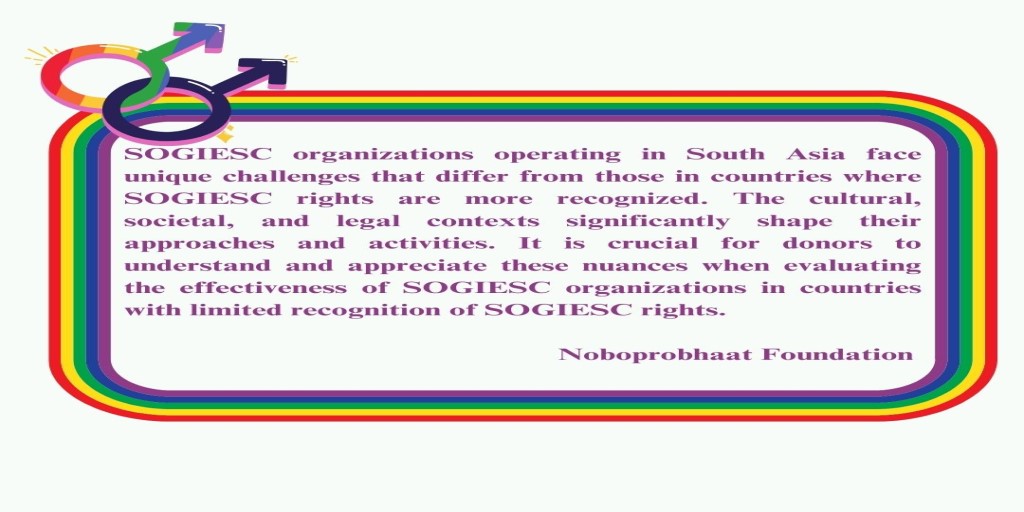The struggle for SOGIESC rights in South Asian countries, such as Afghanistan, Bangladesh, Pakistan, Maldives, and Sri Lanka, faces numerous challenges. These challenges are further compounded by limited funding resources available to small SOGIESC organizations operating in these countries. Government policies and the reluctance of international donors to support SOGIESC initiatives have significantly weakened these organizations. To address this urgent issue and protect the lives of SOGIESC individuals in these countries, the Noboprobhaat Foundation calls on donor organizations, SOGIESC organizations, international organizations, coalitions, platforms, and think tanks to implement a country-based quota system for funding. This article aims to shed light on the importance of such a system and the need for funding prioritization.
The Current Funding Crisis: In recent years, funding resources for small SOGIESC organizations in South Asian countries have dwindled, posing a severe threat to their existence. The Bangladeshi government’s policies, such as requiring registration and approval from the NGO Bureau for organizations to receive funds, have hindered the growth and operations of SOGIESC organizations. Moreover, international donors have been hesitant to support SOGIESC initiatives due to various factors, including cultural sensitivity, political implications, and concerns about the effectiveness of their contributions.
Disparity in SOGIESC Rights: While countries like India, Nepal, and Bhutan have made significant strides in recognizing and protecting SOGIESC rights, Afghanistan, Bangladesh, Pakistan, Maldives, and Sri Lanka lag behind. SOGIESC individuals in these countries continue to face discrimination, stigma, and even legal repercussions for their sexual orientation or gender identity. The absence of legal recognition and protections exacerbates the challenges faced by SOGIESC organizations operating in these contexts.
Importance of a Country-Based Quota System: To address the funding disparity and protect the lives of SOGIESC individuals in South Asia, the Noboprobhaat Foundation proposes the implementation of a country-based quota system for funding allocation. This system would prioritize funding for SOGIESC organizations in countries where SOGIESC rights are less recognized or protected. By doing so, donor organizations can acknowledge the unique struggles faced by SOGIESC organizations in these countries and provide the necessary resources to support their vital work.
Recognizing Contextual Challenges: SOGIESC organizations operating in South Asia face unique challenges that differ from those in countries where SOGIESC rights are more recognized. The cultural, societal, and legal contexts significantly shape their approaches and activities. It is crucial for donors to understand and appreciate these nuances when evaluating the effectiveness of SOGIESC organizations in countries with limited recognition of SOGIESC rights. Judging these organizations solely based on standards set by countries with established SOGIESC rights can lead to unfair and negative outcomes, hindering progress and further marginalizing SOGIESC communities.
Promoting SOGIESC Leadership: Another critical aspect of funding SOGIESC organizations is ensuring that the funds reach organizations led and operated by SOGIESC individuals. While non-SOGIESC organizations may have good intentions, the mismanagement or misappropriation of SOGIESC funds can have detrimental effects on the community. Donors should prioritize supporting SOGIESC-led organizations to ensure that resources are effectively utilized and empower local SOGIESC activists to drive change within their communities.
Call to Action: In order to address these pressing issues, collaboration among various stakeholders is essential. Donor organizations, SOGIESC organizations, international organizations, coalitions, platforms, and think tanks must come together and take appropriate steps to support SOGIESC organizations in South Asian countries. This includes advocating for a country-based quota system for funding allocation, recognizing the unique challenges faced by SOGIESC organizations in these countries, and supporting SOGIESC-led initiatives.
Conclusion: The funding crisis facing SOGIESC organizations in South Asian countries poses a significant threat to the well-being and safety of SOGIESC individuals. By implementing a country-based quota system, donors can prioritize their support for organizations operating in countries with limited SOGIESC rights. It is imperative that funding reaches SOGIESC-led organizations to ensure effective resource utilization and empower local activists. Together, stakeholders can work towards building a more equitable and inclusive future for SOGIESC communities in South Asia.

